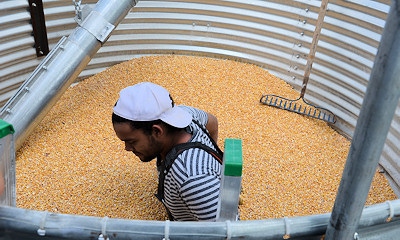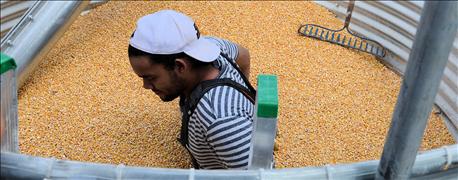March 22, 2016

You’ve read and heard about not going into a grain bin with the auger running all your life. Maybe you’ve even heard about Roger Cain, the Rushville farmer who died recently in a grain bin. Yet you’ve got to get the truck loaded for morning, and something has the unloading auger stopped. You’ve done this before- what’s the big deal? Get in, get the clog freed and get out.
That’s the farmer’s equivalent of knocking on wood. It only takes one time to create a tragedy- a life-changing and perhaps life ending event that’s the one time you don’t get out.. of the bin, alive.

TRAINING MATTERS: Local fire departments have a better chance of responding successfully to a farm emergency if they are trained in advance. This training of a mock grain bin entrapment incident was carried out for the Bargersville Fire Department.
Take time to check out these sources of information, especially if you’ve still got grain stored on the farm, with the busy ‘rush, rush’ planting season coming soon.
1. Stay out of the grain bin for us- Roger Cain’s family
If you think tragedy couldn’t strike on your farm, go back and read this chilling account of how Roger Cain perished in a grain bin just weeks ago, told by his wife, daughters and niece. Imagine what it would be like if it was your family sitting around the dining room table instead of the Cain family.
2. What you should know about working in grain and in grain bins
The real tragedy is that staying safe working around grain bins isn’t rocket science. There are tons of resources available that feature safety tips. Perhaps the first step is to understand the power that flowing grain possesses. No one is a match for that kind of power.
3. Five crucial steps to preventing grain bin entrapments
The first step is often the rule most often broken. Stay out of the grain bin with the auger running. Experts suggest putting your creativity to work to find ways to free the auger without having to be in the bin with the auger running. The best way is to prevent spoiled grian in the first place, although that’s not always the easiest to achieve.
4 Family shares memories of a life well-lived
Christie Cian and her family chose to speak out because they want other farm families to escape the pain and suffering they’re enduring. But that’s not all they shared. They opened up about the rich life they enjoyed with their husband, father and uncle. If you need more motivation to stay out of the bin, check this one out.
5. Purdue releases 2014 farm fatality report
If it takes statistics to get your attention, check out the 2014 Indiana Farm Safety fatality report issued recently by Bill Field, Purdue University Extension safety specialist. One of the chilling facts in this report is a rundown of each farm fatality for the year, including location and cause of death. Grain bin accidents aren’t the leading cause of death on farms, but every life lost is one too many, Field believes.
6. Learn more about why working in confined spaces is dangerous
Suffocation accidents on the farm aren’t limited to grain bin entrapments. Fatalities happen in other confined spaces, including in livestock barns, particularly in manure pits. Get a better handle on how to prevent this class of accidents.
7. Zero in on statistics of farm confined space accidents over 50 years
Field and his staff recently released a summary report of grain bin incidents, and incidents in all confined spaces, national in scope, and going back 50 years. It was the culmination of a federally-funded project to identify and record these types of accidents.
8. 8 things farmers need to know when calling 911
The 911 system is a great tool that speeds up response to emergencies. But it only works if you know how to use it. One thing you learn, Field says, is that at that moment, the 911 operator at the control center is the most important person in your life.
9. Grain handling safety workshops for young workers come at good time
Purdue has spearheaded training for young workers, especially those who might work on farms or at grain or fertilizer dealerships where they could be working in confined spaces. This is a program worth knowing about. The first training session has happened, but the next is April 1.
10. Who will train firefighters and EMTs in the next decade?
Funding for farm safety and farm safety training isn’t endless. In fact one key four-year program Field used to train first responders across the state is now over. Funding for this federal grant wasn’t renewed. Roger Cain’s family wants to know how trianing can continue. The last thing they want is for Roger to just become a statistic.
You May Also Like




